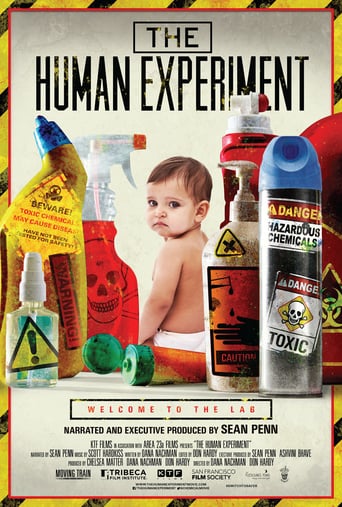

The Human Experiment (2013)
A documentary that explores the potential dangers of toxic chemicals in consumer products and the recent spike in unexplained health phenomena.
Watch Trailer
Cast
Similar titles



Reviews
Plenty to Like, Plenty to Dislike
Although I seem to have had higher expectations than I thought, the movie is super entertaining.
Watching it is like watching the spectacle of a class clown at their best: you laugh at their jokes, instigate their defiance, and "ooooh" when they get in trouble.
It is encouraging that the film ends so strongly.Otherwise, it wouldn't have been a particularly memorable film
In my opinion, this documentary was spot on with exposing the chemical industry. Anyone that says otherwise is either in denial, is a good little sheep, or is working for the wrong team. Yes, Americans should already be fully aware that politicians and big industry can't be trusted, but most probably have no idea the amount of chemicals we are exposed to everyday. Just as someone said in the doc, you shouldn't need a degree in biochemistry to shop at the store. This documentary is not "biased". It tells the truth flat out. To be biased means to be unfairly prejudice and there is nothing fair about what this industry is doing to people by slowing poisoning them through products through everything from food to packaging to upholstery to cosmetics, you name it. There has definitely been an increase is diseases over the last 50 years and it's hard to deny that the common element is the chemicals. You don't really even need the hard science, it makes PERFECT sense when you consider the sheer amount of chemicals, low regulation, and the industry's efforts to keep it that way. Congrats on HR 2576!
Subject matter of extraordinary significance should help to create a movie of extraordinary insight, depth and detail. This movie is somewhat mundane, one-sided, and nearly lacking in science. It adds little new to the discussion of toxic chemicals, but mostly presents material that should be obvious to most reasonably intelligent people.We already know that man-made chemicals that enter the body tend to be harmful. We know that industry is motivated by profit, and that the people in charge tend to be of low or questionable morality. We know that corrupt politicians are bought by corporations. We know that disease has a negative impact on people's lives, and that people want good health for their children.Sometimes documentary filmmakers can't avoid having an opinion. But if the filmmakers are trying to make a point they need to also present the best possible opposing points, not just views they can easily dismiss.I challenge the filmmakers to go deeper. Make another movie which includes more science, some credible opposing views, and less victim impact material. A small amount of that does help to humanize the issue, but in this case it was overdone.There needed to be more discussion of risk versus reward, of relative safety, and a path towards better science. The movie is too much about the problem rather than the solution.One redeeming aspect, however, was placing greater responsibility with the consumer. Corporations are not going to stop being immoral and greedy any more than politicians are going to start telling the truth. Educate yourself and stop buying harmful products in order to encourage the production of safer ones.Additionally, support politicians who have a good record on consumer product safety, environmental issues, food safety, and a record of standing up to toxic corporations and to government agencies when those agencies fail to protect.
This had the distinct feeling of the exact same sort of slick misuse of words that I would expect from any film put together by someone trying to obfuscate a topic in order to ram through an agenda. The largest point was the clear misframing of points by the narration, including the complete avoidance of nuances that some people that were interviewed clearly did show.The film interchangeably talks about the dangers of chemicals, the dangers of cancer-causing chemicals, and the dangers of artificial chemicals, as though it has no understanding that all things are chemicals, that many chemicals it uses as examples of health risks are, in fact, naturally-occurring, and that amounts of exposure do matter. It becomes quite clear that some people interviewed are aware of this and only discuss toxic chemicals, but the narration in the film, especially early on when context is being established, fails to do so.There's also some very suspicious handling of data, providing some data and then stating that there are exceptions that strengthen their case, again a tactic of the film, not those interviewed. There's also some concerning discussion, like discussions on autism that sound very suspiciously like the arguments that come from long-since discredited anti-vaccination proponents about chemicals and autism (discussions like not wanting children to 'develop' autism). As they are generally arguing against the scientific consensus in some cases, this also sounds concerningly like the same anti-science conspiracy arguments that come from anti-vaccine proponents, creationists, climate-change deniers, and tobacco companies (the last being particularly ironic).For what could be a very interesting topic, it's clearly pushed blindly to further an agenda rather than actually examine the issues in question. Rather than trying to present facts and letting the audience process it all, they simply through every allegation they have, often allegations that are contradictory, and many of which run counter to available data when followed up on. It's a film that seems founded on lies and deceit conveyed in a slick presentation in an attempt to hide an agenda that utterly sabotages any attempt to take a real and serious look at what sorts of exposures we face to various chemicals, and it'a a shame that they so willingly undercut the significance of the topic like this.
I wasn't planning on seeing "The Human Experiment" but needed something to bridge the two films I did want to see today. I'm sorry I saw it as the experience was detrimental to my blood pressure. I should preface the following by saying that I'm a card carrying ACLU liberal who thinks that practically all public pronouncements from "big business" is self-serving B.S. Yet movies like this do far more harm than good by making it easy for the pro-business, anti-regulation, right-wing in this country (aka, Republicans) to say "See, the left is just as biased as the right".The cinematography is top notch. However, the movie relies exclusively on anecdotes and emotional appeals rather than data to make its case. The few factual assertions are almost all half-truths, misinformation, or outright falsehoods. An example of the latter is that your skin provides a direct path for "chemicals" into your blood (this was in the context of skin care products). That is not true.Note that I deliberately used scare quotes around the word chemicals because that is how it is used throughout the film. The people who made and appear in the film don't seem to be aware that everything is made of chemicals and all chemicals are toxic at a high enough concentration or under certain conditions. Consider the chemical dihydrogen monoxide (http://www.dhmo.org/facts.html). Or ascetic acid (a common component of salad dressing). Yes, those examples are silly but that's the level of argument made in this film.




